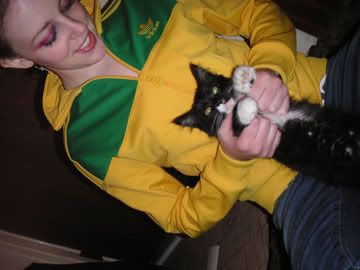The Savage Detectives by Roberto Bolaño
I cannot recall the day I started this book; I know it was a while ago, though. I picked it up because it is one of Paul Dresman’s favorites (or so I hear). Let me describe Paul Dresman for you: A professor of literature at the University of Oregon, he taught 20th Century Novel and Beat classes among others, but that’s not why we like him. No, we like the way he laughs at his own jokes; the way his leathery skin is stretched over his skull; the way he gets hot during a lecture and unbuttons his floral-print shirts; the way he looks like he’s always on vacation, even while asking you questions about The Dubliners; the way you love him or hate him; and the way he interests those who study sciences, not just English.
Dresman read this novel in its original Spanish, and was waaay excited that it got translated. When I took a class with him, we didn’t read this novel, but he taught it in another novel class (Nate was supposed to read this book, but skipped most of the middle). So, Nate had this poor unread book sitting on its shelf, and all I needed to hear to convince me to read it was “Dresman.” WE LOVE THE GUY.
My review is going to be discombobulated, because my reading of the novel was discombobulated. I picked it up long ago (almost two months?) and took an absurdly long time to read its 577 pages (thank you, Spring Break, for affording me the time to finally finish). I wish I could say I savored it, but I didn’t; at times, a week went by when I didn’t crack it open. Sorry, book, I didn’t mean to hurt you.
Recommendation: read this novel if you’re patient. If you’re impatient, stay away from it. Common negative responses to it are because of its length and its style: the first and third sections are written as diary entries, and the middle section contains something like 50 narrators (however, the narrators are always clearly identified). You will spend hundreds of pages wondering, “What the hell is the point?” But if you’re patient, the point will become clear. And even if it doesn’t, you will enjoy the language.
THIS BOOK IS ALIVE! There are many characters, fictional and nonfictional, and they all feel real. There are no caricatures, even if the story borders on the ridiculous. I could believe every last bit of sex, violence, drug use and poetry. So, even if you can’t make it through the whole thing, or it takes a dreadfully long time to do so (like me!), the characterization is palpable. If anything, it’s a good lesson in how to create full-bodied characters.
So, umm, what is this story about, anyway? Its protagonist is Juan Garcia Madero, a 17-year-old who gets sucked into a poetry movement in Mexico, Visceral Realism. The plot hinges on the two leaders of this group, Arturo Belano and Ulises Lima, as they cavort across the planet and search for the mother of the first phase of Visceral Realism, Cesárea Tinajero.
The novel is a savory ride through these boys’ experiences, as we watch them age, grow up, and wind through countless lives. What is it to be a poet? How do you found a literary movement? Even if you age, do you grow up? What is growing up, anyway? How many artists have become household names? How many artists faded into obscurity? What happens if you get killed in a foreign place? Will anyone realize you’re gone? Did I ask enough questions?
I could analyze the structure of the book (some say it’s ground-breaking; others say it’s a failure; some say it’s a combination of both), but I won’t. I don’t particularly feel like addressing the relevance of the novel, either. Frankly, I’ve failed in reading this novel. I took way too long to read it, and because it’s not my book, I didn’t take a single note in it (yeah, I know I could have used an index card or Post-It flags, but color me lazy). So, I am failing to provide to you the quality reviews (ha?) you’re used to.
Nevertheless, I will give this novel a hesitant recommendation. Read it if you’re patient and curious; read it if you want to get a peek into some implausible, yet totally tangible, lives. I can compare reading this novel to something a minor character notes while watching a major character and another engage in a sword duel: “In a brief moment of lucidity, I was sure we’d all gone crazy. But then that moment of lucidity was displaced by a supersecond of super-lucidity (if I can put it that way), in which I realized that this scene was the logical outcome of our ridiculous lives. It wasn’t a punishment but a new wrinkle. It gave us a glimpse of ourselves in our common humanity…” (454).
KK
